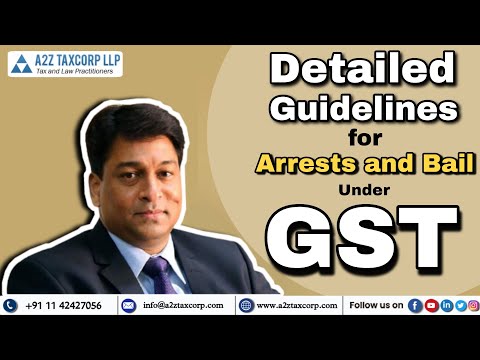Key Takeaways
- The CGST Act allows for arrest in cases of substantial tax evasion, typically involving fraud over Rs. 5 crore.
- Offenses under the CGST Act are classified into cognisable (arrest without a warrant) and non-cognisable (requires a warrant) to ensure an appropriate legal response.
- Exceptional circumstances, such as the risk of evidence tampering or obstruction of justice, can justify arrest before tax assessment completion.
- Anticipatory bail may be available for CGST offenses, dependent on the court’s assessment of flight risk and the severity of the offense.
- Police play a crucial role in supporting GST officers in enforcing the CGST Act, particularly in operations requiring immediate and forceful action.
The Central Goods and Services Tax (CGST) Act, implemented as part of India’s comprehensive tax reforms, streamlines the tax structure by subsuming multiple indirect taxes. This piece of legislation not only facilitates a uniform tax rate across the country but also grants specific powers to tax authorities, including the power of arrest for certain offenses.
What offences could lead to an arrest under the CGST Act?

Under the Central Goods and Services Tax (CGST) Act in India, Section 69—the power of arrest under GST—certain offenses are considered severe enough to warrant an arrest.
These offenses primarily involve significant tax evasion and fraudulent activities like refunds of tax that directly affect the financial health of the state’s economy. Here are the main offenses under the CGST Act that could lead to an arrest:
- Supply of any goods or services without an invoice or with a false invoice: This is done to evade taxes and can lead to arrest if the authorities catch the perpetrator.
- Issuing invoices using the GSTIN of another bona fide taxpayer: Such an action constitutes fraud and misrepresentation, leading to wrongful financial gain at the expense of another.
- Collection of GST but failure to remit it to the government within three months: This offense shows intent to embezzle money collected as tax, which is a criminal act under the CGST.
- Evasion of tax, availing of input tax credit (ITC) without actual receipt of goods or services, or fraudulently obtaining refund claims: These actions are considered serious because they involve a direct loss of revenue to the government and manipulation of the tax credit system.
- Obstruction or tampering with any evidence: This includes the destruction of documents that are required for the successful prosecution of a tax evasion case.
- Failure to supply any information required by a GST officer or supplying false information: This offense hampers the investigation and administrative processes, leading to potential prosecution.
- Repeated offenses despite previous penalties and legal actions: When a taxpayer continuously engages in fraudulent refund practices or repeats offenses despite facing legal actions, they can be subject to arrest to prevent further evasion.
The threshold for these offenses to lead to arrest usually involves large sums, with the benchmark often set in terms of the amount of tax evaded, typically in cases where the amount exceeds a specified limit, such as Rs. 5 crore. The CGST Act empowers designated officers to make arrests in these cases, which are usually considered cognizable and non-bailable, depending on the severity and nature of the offense.
Types of Offenses
In the legal context within India, offenses are categorized into two types: cognisable and non-cognisable. This classification determines how law enforcement can respond to an alleged offense, particularly in terms of arresting the accused without a warrant.
- Cognisable Offence
A cognisable offence is one where the police are authorized to arrest the accused without a warrant. These are generally more serious crimes that may pose immediate danger or have severe implications, such as murder, robbery, rape, or, in the context of tax laws, significant tax evasion.
The nature of these crimes often justifies immediate and proactive action by the police to prevent further harm or ensure that the accused does not evade legal proceedings. Under the CGST Act, certain severe tax-related crimes, like evading tax above a certain substantial amount, are treated as cognisable offences.
- Non-cognisable Offence
A non-cognisable offence, on the other hand, is less severe and does not permit the police to make an arrest without a warrant from a court. These offenses are considered to be less of a direct threat to public safety and order, involving, for example, minor theft, simple assault, or smaller cases of tax evasion under the CGST Act. For such crimes, police officers must obtain permission from a magistrate to arrest an individual suspected of a non-cognisable offence.

What Is the Difference Between a Cognisable and a Non-cognisable Offense?
Below is the information you requested presented in tabular format, highlighting the key differences in legal handling between cognisable and non-cognisable offences:
| Aspect | Cognisable Offences | Non-cognisable Offences |
|---|---|---|
| Arrests | Police can arrest without a warrant due to the seriousness and immediate risk of the crime. | Police cannot arrest without a warrant, indicating a lower immediate risk from the crime. |
| Prosecution | Generally, this leads to more severe legal proceedings and potentially stricter penalties. | It often results in lighter penalties and may only necessitate fines or short-term punishment. |
| Legal Process | There is no need for a warrant, allowing for swift legal action to address the threat or harm posed. | Requires a warrant for arrest, ensuring a magistrate reviews the circumstances first. |
This table concisely explains how legal handling differs based on the classification of the offence, reflecting the varying levels of severity and procedural requirements.
Exceptional Circumstances Warranting Arrest Before Assessment
When discussing the exceptional circumstances warranting arrest before assessment under the Central Goods and Services Tax (CGST) Act, it is crucial to understand the specific legal framework that allows for such preemptive actions. The key provisions are designed to prevent substantial harm to the tax revenue system and ensure compliance with tax laws. Here are the essential factors and legal grounds that justify an arrest before the completion of a tax assessment:
- Grounds of Arrest
Significant Tax Evasion: When there is clear evidence suggesting that a taxpayer has engaged in actions intended to evade paying a significant amount of tax, authorities may proceed with an arrest to prevent further loss to the state exchequer.
Use of Fake Invoices: The creation or circulation of fake invoices to claim input tax credit fraud is a serious offense that can lead to an arrest to prevent ongoing fraudulent activities. - Economic Offence
Large-scale Fraud: Arrests prior to assessment are more common in cases categorized as large-scale economic offenses, where the actions of the taxpayer could significantly disrupt economic order or cause considerable loss to the treasury. - Cognizable and Non-Bailable Offense
High Threshold: Offenses under the CGST that lead to arrest without a warrant are generally cognizable and non-bailable, particularly when the amount involved exceeds thresholds stipulated by the law, such as fraud involving amounts greater than Rs. 5 crore. - Relevant Provisions
CGST Act Guidelines: The CGST Act outlines specific arrest provisions under which the arrest is justified, focusing on protecting the integrity of the tax system and ensuring secretarial compliance from high-risk honest taxpayers. - Arrest Warrant
Judicial Scrutiny: In cases where an arrest before assessment is necessary but the offense is not cognizable, authorities must obtain an arrest warrant from a judicial officer, ensuring that there is legal oversight. - Concerned Person
Flight Risk Assessment: If there is substantial evidence that the person involved might flee the jurisdiction to evade prosecution, immediate arrest can be deemed necessary. - Coercive Action
Non-compliance with Summons: Arrests can also be made if a person repeatedly fails to comply with legal summons for tax assessment, indicating a deliberate intent to obstruct the process. - Judicial Scrutiny
Protecting Rights: Arrest decisions undergo rigorous judicial scrutiny to balance the state’s need to secure tax revenues with the protection of individual rights, ensuring that arrests are not made lightly or without sufficient cause.
The CGST framework establishes stringent criteria for making arrests before tax assessment, primarily to address situations where the risk of evasion, fraud, or economic disruption is high. This approach helps maintain the integrity and effectiveness of the tax system while ensuring that taxpayer rights are safeguarded through judicial oversight.
Can anticipatory bail be granted for such offences?
The question of whether anticipatory bail can be granted for offenses under the Central Goods and Services Tax (CGST) Act involves understanding various legal provisions related to arrests, especially concerning non-bailable and cognisable offenses.

Provisions for Arrests under the CGST Act
Under the CGST Act, the provisions for arrests are particularly stringent due to the nature of the offenses, which predominantly relate to tax evasion and fraud, critical issues that significantly impact the government’s revenue.
The CGST Act specifies conditions under which individuals can be arrested for tax-related crimes, emphasizing the gravity and potential impact of such offenses.
- Bailable and Non-Bailable offenses
The distinction between bailable and non-bailable offenses is crucial in the context of bail.
Bailable offences: These give the accused the option of receiving bail by default unless the court has good reason to deny bail.
Non-bailable offenses: Bail is not a right, and the accused must convince the court that they deserve bail based on circumstances like the nature of the crime, the character of the accused, and other relevant factors.
Provisions of Arrest and Anticipatory Bail
Anticipatory bail, which is bail in anticipation of arrest, can be sought under Section 438 of the Indian Code of Criminal Procedure, 1973. However, whether anticipatory bail can be granted in cases under the CGST Act largely depends on:
- The severity of the charge.
- The amount of tax evasion involved.
- The perceived risk of the accused absconding or tampering with evidence.
- Judicial Interpretations
The courts have occasionally taken a nuanced approach when it comes to granting anticipatory bail for economic offenses. The key considerations include:
- Risk to economic stability: Given that economic offenses can pose a serious threat to the financial fabric of a country, courts are generally cautious.
- Individual circumstances: Courts also consider individual circumstances of the accused, such as their past criminal record, their role in the community, and the likelihood of them influencing witnesses or tampering with evidence.
In summary, while anticipatory bail is technically available for non-bailable and cognisable offenses under the CGST Act, its grant is not guaranteed and is heavily reliant on the courts’ discretion, which weighs the potential risks to public and economic welfare against the individual’s rights and freedoms.
Which officers are required to assist CGST and SGST officers?
Under the framework of the Central Goods and Services Tax (CGST) and State Goods and Services Tax (SGST) in India, various officers are mandated to assist in enforcing the provisions of the respective acts. The cooperation between different authorities is essential for the effective implementation and enforcement of tax laws. Here’s a detailed look at which officers are required to assist CGST and SGST officers:

- GST Officers
Officers appointed under the CGST and SGST acts are primarily responsible for the enforcement of these laws. They include commissioners, joint commissioners, assistant commissioners, and other appointed GST inspectors who have the authority to conduct audits, inspections, and investigations.
- Police Officers
Police officers play a crucial role in assisting GST officers, especially in matters involving fraud, evasion, or any other criminal activity related to tax laws. They help in executing search and seizure operations, providing security during raids, and ensuring the safety of GST officers during their duties.
- Customs Officers
Customs officers under the Department of Revenue are also pivotal in supporting GST operations, particularly in dealing with the import and export of goods. They ensure business compliance with tax laws at entry and exit points in the country, preventing tax evasion related to international trade.
- Income Tax Officers
While their primary role is the enforcement of direct tax laws, income tax officers occasionally collaborate with GST officers when their investigations reveal information relevant to GST compliance. This includes sharing data about financial transactions that may have implications for GST liabilities.
- Officials from Other Departments
Officers from other relevant departments and agencies, such as the Directorate of Revenue Intelligence, the Enforcement Directorate, and the Central Bureau of Investigation, may assist in complex cases involving substantial economic offenses or interconnected crimes spanning multiple jurisdictions and legal frameworks.
- State Government Officers
In the case of SGST, officers from relevant state government departments are required to assist SGST officers. This includes local law enforcement and state financial departments, which provide logistical and administrative support.
- Judicial Authorities
Although not directly involved in enforcement, judicial authorities assist by providing timely legal sanctions for various enforcement actions, like issuing warrants or adjudicating disputes related to tax assessments and penalties.
The collaboration of these diverse officers ensures that the tax administration is robust and capable of dealing with various challenges that arise in the implementation of GST. This integrated approach helps in creating a compliant business environment and enhances revenue collection, thereby supporting the broader economic goals of the country.
Conclusion
The power of arrest under the CGST Act is a critical tool for deterring tax evasion and ensuring compliance. Understanding the distinctions between different types of offences and the conditions under which these powers can be exercised is vital for businesses and tax professionals.
Additionally, the CGST Act’s distinctions between cognisable and non-cognisable offenses offer deeper insights into how the legal system treats these offenses, highlighting the significance of the immediate risk they pose to public order and fiscal stability.
💡Download Pice, ensure timely GST payments, and maximize your cash flow by using your credit card.
FAQs
What is the threshold amount for a CGST-related arrest?
Under the Central Goods and Services Tax (CGST) Act in India, the threshold amount for an arrest related to tax evasion generally involves substantial sums, typically when the amount of tax evaded or involved in fraud exceeds Rs. 5 crore. This threshold underscores the severity with which the law treats high-value offenses, aiming to deter substantial tax evasion and ensure significant compliance among taxpayers.
Can a person be arrested for minor CGST violations?
Typically, a person is not arrested for minor CGST violations, as these infractions usually result in penalties or fines rather than criminal proceedings. Arrests under the CGST Act are generally reserved for serious offenses involving significant amounts of tax evasion or fraud. Minor violations are handled administratively to ensure compliance without invoking the harsher punitive measures of the law.
How does anticipatory bail work in cases of CGST offences?
Anticipatory bail in cases of CGST offences allows individuals to seek bail in anticipation of an arrest on charges under the CGST Act. This type of bail can be granted when the accused presents a case in which they pose no flight risk and will comply with the investigation. The court considers the severity of the offense, potential harm to the public, and the likelihood of the accused tampering with evidence or influencing witnesses when deciding on granting anticipatory bail.
What role do police play in CGST enforcement?
In CGST enforcement, police play a supportive role, particularly in situations involving criminal activities related to tax evasion. They assist GST officers by helping to execute search and seizure operations, providing security during raids, and ensuring the enforcement of the law. Their involvement is crucial in cases where there is a need for immediate action to prevent fraud or arrest offenders under the CGST Act.
Are there any recent changes to the CGST Act regarding arrest powers?
As of my last update, there haven’t been specific recent changes to the arrest powers under the Central Goods and Services Tax (CGST) Act that have been widely publicized. Typically, amendments to such significant aspects of the law would be well-documented and discussed in legal and business circles. For the most current information, it’s advisable to consult the latest government releases or legal updates from reliable sources specializing in tax law.








